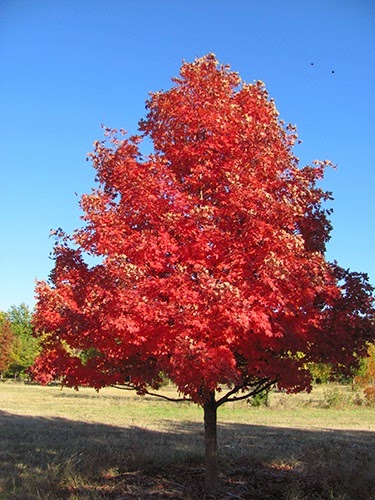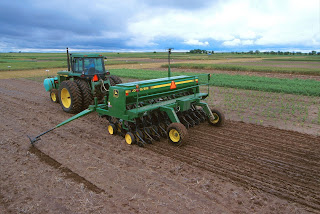Industrial hemp research update at K-State Research and Extension!
Sandra
L. Wick, Crop Production Agent
 | |
| Industrial Hemp Research Plots at NW Region Extension Center |
K-State
Research and Extension researchers hope to answer questions about the new crop
to help farmers avoid risks.
The first test crops of industrial hemp have
been growing for about two months at the John C. Pair Horticulture Center in
Haysville near Wichita, the Olathe Horticulture Research and Extension Center
in the Kansas City metro area, and the Northwest Research-Extension Center
in Colby.
K-State researchers are seeking answers
to many questions, including whether to grow hemp for grain, fiber or CBD
(cannabidiol) oil. One can hardly look at a drugstore shelf without seeing CBD
as an ingredient in a wide range of products based on its reported health
value.
“Right now, the revenue generation is
definitely in CBD production, so that's getting a lot of excitement,” said
Jason Griffin, director of the John C. Pair Horticulture Center. But growing
hemp for grain, fiber or both, through dual-purpose production, offers what
Griffin calls a mind-boggling variety of options.
While some people might think of hemp only
in terms of rope, Griffin said hemp uses have expanded far beyond mere ropes.
From paper products to flooring materials and even hempcrete – concrete
reinforced with hemp fiber to strengthen it – “the uses for industrial hemp are
almost limited only by the imagination,” he said.
With all those uses, it’s easy for people to
get excited about the prospects of growing hemp. But Griffin recommends
caution. “It's going be an alternative crop to work in with your corn or with
your wheat, where you can seed – maybe apply some irrigation, maybe not – but
that's part of the reason we're doing research to see if dryland industrial
hemp will produce as well as irrigated. “But
it is certainly an option for Kansas farmers in the future, for adding a
different crop to their rotation.”
 So far our biggest challenges, according to Dr. Lucas Haag,
K-State Research and Extension-NW Region Agronomist, is obtaining the seed,
actually getting a stand after planting (so far hemp looks like a pretty weak
seedling that does not handle a crust very well), and weed control.
Countless hours have been spent hand weeding each week trying to stay ahead of
the palmer amaranth and the puncture vine.
So far our biggest challenges, according to Dr. Lucas Haag,
K-State Research and Extension-NW Region Agronomist, is obtaining the seed,
actually getting a stand after planting (so far hemp looks like a pretty weak
seedling that does not handle a crust very well), and weed control.
Countless hours have been spent hand weeding each week trying to stay ahead of
the palmer amaranth and the puncture vine.
K-State Research and Extension is
testing several different production techniques, fertilizer treatments, and
looking for pests and diseases. In many cases, the test crops are modeled on
what Colorado growers have done, including using trellis supports.
The Pair
Center is testing 17 different varieties, while the Olathe center planted one variety to observe how multiple
environments affect growth. At both
sites, it’s easy to see the plants grown in high tunnels are much more robust
than those in open-air beds, but the researchers are seeking far more data
points than the “eyeball test.”
Growing well for various end uses is an
obvious concern, but another is making sure the plants remain legal and don’t
have to be destroyed according to United States drug control laws.
The Colby
Center has 16 varieties in a replicated trial including 2 fiber types, 4
grain types, and 10 dual-purpose (grain and fiber) types. Several of these are
potential candidates for CBD production as well. There are no horticultural
type production systems (e.g. hoop house or space planted clones), at the Colby
location and the trials are setup as “broad-acre” agronomy type production from
planted seed. Everything was drilled on 10” spacing into 2018 corn stalks
that had been tilled. Several of these varieties are also part of an irrigation
study where there are 3 levels including dryland, fully irrigated, and 50% of
fully irrigated. Neutron access
tubes are being used to quantify water use by the hemp.
 Different kinds of cannabis plants have
different uses depending on how much of the chemical compound THC is present.
Marijuana has significant levels of THC, which is what produces a “high”.
Industrial hemp, on the other hand, is low in THC which allows for its myriad
of uses.
Different kinds of cannabis plants have
different uses depending on how much of the chemical compound THC is present.
Marijuana has significant levels of THC, which is what produces a “high”.
Industrial hemp, on the other hand, is low in THC which allows for its myriad
of uses.
It’s all closely controlled. When test programs launched this year,
researchers and independent growers in Kansas had to be licensed by the Kansas
Department of Agriculture, which included undergoing a criminal background
check and making their fingerprints accessible to the FBI.
The 2018 Farm Bill made all of this
possible. Industrial hemp now can be grown in pilot programs under the U.S.
Department of Agriculture and state departments of agriculture.
“We're part of a USDA multi-state industry
hemp project, so we have some dual-purpose varieties in the field that we
planted with a drill, seeded into the soil,” Griffin said. “We're going to be
looking at grain production and fiber production on a per-acre basis. We also have a healthy population of plants
for CBD production with looking at fertility and at some training systems.”
Noting that K-State scientists are in the
infancy of experimentation with the crop, Griffin said they are rapidly gaining
time- and cost-saving experience “so that we can get that information out there
for the farmers, for the growers who want to grow this, so that they can learn
from our mistakes.”
Griffin points out that they can make
mistakes and give them the good information to let them go forward and grow a
healthy crop and let us fail, but the farmers succeed, if that's what it comes
down to.
 For more information, Haag has developed a
site for excellent resources at the K-State Research and Extension, NW Region
website at https://www.northwest.k-state.edu/agronomy/industrial_hemp_resources.html.
For more information, Haag has developed a
site for excellent resources at the K-State Research and Extension, NW Region
website at https://www.northwest.k-state.edu/agronomy/industrial_hemp_resources.html.
The KS Department of Ag also has an
excellent source of information as the “regulating” agency of the Industrial
Hemp program at https://agriculture.ks.gov/divisions-programs/plant-protect-weed-control/industrial-hemp.
Post Rock Extension District of K-State
Research and Extension serves Jewell, Lincoln, Mitchell, Osborne, and Smith
counties. Sandra may be contacted at swick@ksu.edu or by calling Smith Center,
282-6823, Beloit 738-3597, Lincoln 524-4432, Mankato 378-3174, or Osborne
346-2521. Join us on Facebook at “Post
Rock Extension” along with our blog site at postrockextension.blogspot.com. Also remember our website is www.postrock.ksu.edu and my twitter account is @PRDcrops.







